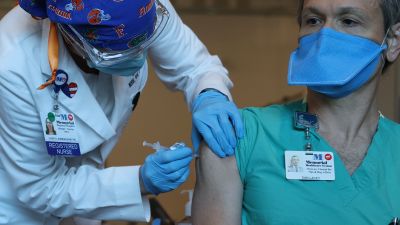
QUEENS, NY- MAY 11: A funeral home in the epicenter of the COVID-19 pandemic deals with an excess of recent deaths because of the virus by storing bodies in the chapel and loading them up into a truck to ship to crematoriums and cemeteries on May 11, 2020 in the Elmhurst neighborhood of Queens, New York. (Photo by Andrew Lichtenstein/Corbis via Getty Images)
This article originally appeared on the Bulletin of the Atomic Scientists.
The COVID-19 pandemic creates universal death anxiety. We cannot see or touch or smell the virus that has now killed 500,000 Americans. It is everywhere and nowhere—making its lethal, invisible contamination seem almost a supernatural force.
Patients in psychotherapy provide a valuable window into COVID death anxiety. Their voices change, one of us (Strozier) has found, and become suffused with dread as they shift from ordinary conflicts involving the self, relationships, and work, to the virus. They feel stalked by it but unable to find the inner resources to deal with its ubiquitous effects.
Two patients, men in their thirties, began their therapy because of their fathers’ deaths from the virus. But both were overwhelmed by the death of endless numbers of fathers throughout the society, which made it difficult for each to mourn his own loss.
Others are overcome by anxiety that even their most rigorous attempts to follow rules and regulations cannot keep them safe. One dreams almost nightly of forgetting to wear his mask, or of the rubber band on his mask breaking, or of being out of hand sanitizer. Another, an elderly cancer survivor, expresses constant fear of contagion and is terrified to take the elevator in his building.
Another cancer survivor was made so anxious by COVID news that she turned off her TV and cut off other sources of information. She then had a life-affirming dream of becoming pregnant, but, upon awakening, quickly rejected the thought because of her fear of the virus.
Unmanageable death anxiety can lead to psychosis, as in the case of a woman who pivoted from ordinary unhappiness at her divorce to paranoid hallucinations and delusions that she was living in a police state, and authorities were imposing restrictions in order to kill her.
Nor are therapists immune from pandemic death anxiety—as one of us (Strozier) painfully learned when a close relative came down with an illness that, at first, seemed to resemble symptoms of the virus. Strozier’s anxiety was intensified when a close colleague died of COVID after 70 days in an intensive care unit, and when a best friend survived the virus but continued to struggle with its lingering effects, what is now called long-haul COVID.
The personal and the collective reverberate. COVID death anxiety inundates American society. But we also live in the shadow of the apocalyptic twins of nuclear and climate threat, which further fuel the newly terrorizing COVID anxiety.
In addition, the Black Lives Matter movement focuses particularly on African American death anxiety rendered concrete by the recording of George Floyd being suffocated and killed by a white policeman’s knee on his neck. That anxiety is also fed by the higher rates of virus deaths in communities of color.
What does a society do with such massive death anxiety? We have witnessed two antithetical responses.
The destructive Trumpist approach includes several levels of avoidance. Some simply deny the threat of the virus, but others recognize the pandemic and even describe it in lurid terms without psychologically experiencing its effects. They can invoke collective forms of psychic numbing, the active suppression of feeling that one of us (Lifton) originally invoked in connection with nuclear threat. They can also call forth the psychoanalytic defense mechanism called derealization, rendering the actual and dangerous unreal. Derealization feeds the false Trump narrative of brilliant handling of the pandemic. Trumpist avoidance can contribute to malignant versions of death anxiety that result in bizarre and violent behavior, including verbal and physical attacks on those advocating masks and other precautions.
Political actions can be the best means of confronting and overcoming our country’s death-haunted psychological state. The new administration’s urgent focus on containing the pandemic, mostly by disseminating vaccines but also by other elements of a comprehensive national plan, is a way to save tens or hundreds of thousands of lives. Though frequently erratic and incompletely successful, these responses are also a means of helping Americans with their all-consuming death anxiety.
The political and psychological are synergistic. The administration’s task could not be more daunting. But wise political decisions can mitigate the worst effects of collective death anxiety, while a decrease in national dread makes for better, fairer, and more rational politics. Confronting death anxiety together can be a source of personal and collective renewal.



